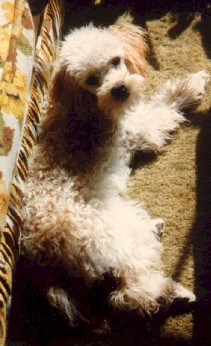|
When we went to select our “pick-of-the-litter”
of apricot miniature poodles, they were all squirming, yapping, and oblivious to
the human that squatted in their midst. All except one, that is. The tiny male runt of the litter wiggled his way
through his brothers and sisters and found his way onto my lap where he promptly
fell asleep. Buffy had made our selection “no contest” and we were his. poodles, they were all squirming, yapping, and oblivious to
the human that squatted in their midst. All except one, that is. The tiny male runt of the litter wiggled his way
through his brothers and sisters and found his way onto my lap where he promptly
fell asleep. Buffy had made our selection “no contest” and we were his.
From the onset, Buffy was plagued with health
problems. He was almost a year old before we discovered that his eating problems
were due to grossly enlarged tonsils blocking his throat. Removal of the tonsils
solved the problem until they grew back and had to be removed a second time!
Dealing with colitis, eye infections, bladder infections and allergies became a
way of life.
But this wasn’t a dog that retreated into his
misery. This was a dog that exuded love. There was NOTHING more important to him
than being with us and bring a smile to our faces. He eventually developed a
repertoire of about 2 dozen superb tricks and taught us the audible and silent
commands which he would respond to. He could imitate an alligator -- crawling
across the floor while snapping his jaws -- choose, with his paw, the closed
hand that held a snack, and yawn on command. His reward was never a treat –
just our applause and hugs.
Just after his 8th birthday, Buffy started to
have more than usual trouble keeping his food down. Within less than a week, he
became listless and lost 3 of his15 pounds. The verdict of the vet was diabetes,
and he spent 7 days in the hospital getting his blood glucose level stabilized
and an effective insulin dose established. We learned how to administer insulin
shots 3 times a day and Buffy learned to pee in a measuring cup on command so
that we could use a litmus paper test strip to check his urine glucose level at
will.
We also learned, from others who were working
with diabetic pets, that we needed to cut his caloric input to keep his weight
down, and to increase his fiber input to slow down his digestion and even out
his glucose level, so we put him on a diet of low fat, low calorie canned food
supplemented with high-fiber dry food.
Fortunately, the vet soon suggested Humulin U
insulin which could be administered once a day instead of three times a day and
it worked well for Buffy. We first tried to keep his urine glucose close to zero
but found him to be very “brittle”, succumbing to hypoglycemia with slight
changes in food intake. So we backed off on the insulin, with a goal of just
keeping his urine sugar within the range of the test strip. With this approach,
and keeping very strict feeding times relative to his morning insulin, he
thrived.
It took almost a year to complete development of
a stabilizing routine, then disaster struck. While keeping track of dinner
preparation activities from his favorite spot in the kitchen, he was
accidentally doused with a large quantity of hot frying oil which spilled off
the stove, and he suffered 1st, 2nd, and 3rd degree burns over more than a third
of his body. During the next 3 months, it was a toss-up as to whether the burns
or the lack of our ability to re-stabilize his blood glucose would be fatal.
True to his nature, he never whimpered while we cleaned and re-dressed the burns
several times a day and his first reaction as we brought him out of numerous
bouts of “insulin shock”, with Karo syrup applied to his gums, was to lick
our hand.
When he finally healed, looking like a patch-work
quilt from a combination of scar tissue and rogue hair, he was his old self --
and then some. His morning insulin shot was the highlight of his day. If I was a
little slow getting around to it, he stuck to my heals until I got it ready.
When he finally saw the syringe in my hand, he sat with tail wagging and head
bowed so that I could easily reach the back of his neck for the injection. As
soon as the needle was withdrawn, I was always rewarded with a wet slurp on the
lips.
Even though liver function tests were continually
negative, this precious animal continued to love us, amaze and amuse us, and
bring us great joy for four more years. Finally, near his 12th birthday, without
warning, his organs began to shut down and even the efforts of our caring vet
who worked with him through the night couldn’t bring him back.
We miss Buffy for so many reasons, but, most of
all, remember him as a perfect example of unconditional love and trust. What a
difference it would make if we were all blessed with such attributes.
-- Contributed by Malcolm Campbell
  



Contributed July 2000
Copyright. All rights reserved.
This site is for information purposes only. Please consult
your veterinarian. |
 Buffy's Story
Buffy's Story  Buffy's Story
Buffy's Story